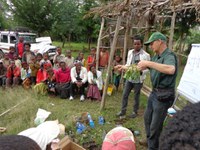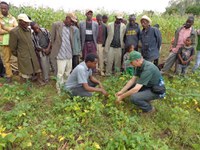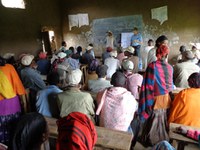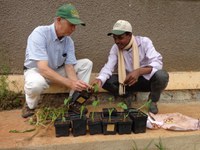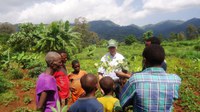Kandel Shares Skills With Ethiopian Farmers
(Click an image below to view a high-resolution image that can be downloaded)
Hans Kandel, NDSU Extension agronomist, traveled to Ethiopia from June 1 through June 18 to share his technical skills and expertise with farmers.
Kandel’s assignment was part of Catholic Relief Services’ Farmer-to-Farmer (FTF) program. The FTF program promotes economic growth, food security and agricultural development in East Africa. Kandel represented the NDSU Plant Sciences Department and NDSU Extension Service during his teaching assignment. This is the first time Catholic Relief Services has been involved in the FTF program.
“Farmers were very receptive to my agronomy training,” Kandel says.
Funded by the U.S. Agency for International Development (USAID), the five-year program matches the technical assistance of U.S. farmers, agribusinesses, cooperatives and universities to help farmers in developing countries improve agricultural productivity, access new markets and increase their incomes.
In Ethiopia, Kandel worked with nine subsistence farm groups, with more than 275 participants, during three-hour training sessions in each village. He also trained 17 development workers during a two-day training session.
The assignment area was near the town of Sodo in the southern part of Ethiopia. The area has a relatively high elevation at around 6,000 feet. The farmers grow teff, wheat, corn, dry beans and various root crops such as cassava.
“I found dry beans that looked dark green and had beautiful nodulation,” Kandel says. “However, I also saw many beans that were yellow and did not have nodules on the roots. Inoculating the beans would be a simple solution to increase productivity.”
In addition to advice on inoculation and utilizing soil with bacteria for dry bean production, Kandel provided education on proper plant spacing, weeding, manure utilization, composting, mulching and crop rotations.
A farm family may have access to only two to three acres of land to produce their food for the year. Besides crop production, most farmers have goats or other livestock. Most of the transportation is by donkey.
Kandel’s trip was one of nearly 500 trips by various experts during a five-year period that focuses on agriculture, food security and nutrition in Ethiopia, Tanzania, Kenya and Uganda.
U.S. experts will travel to East Africa for one to six weeks with expenses covered by USAID.
NDSU Agriculture Communication – July 9, 2014
| Source: | Hans Kandel, (701) 231-8135, hans.kandel@ndsu.edu |
|---|---|
| Editor: | Rich Mattern, (701) 231-6136, richard.mattern@ndsu.edu |

